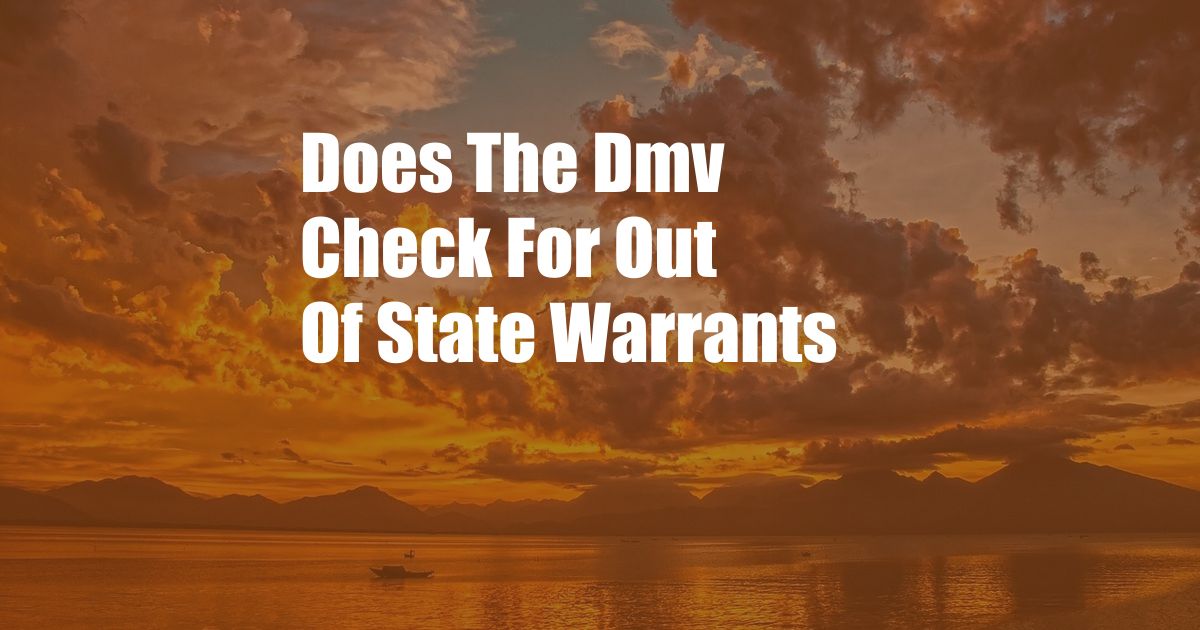
Does the DMV Check for Out-of-State Warrants?
Imagine being pulled over for a minor traffic violation, only to discover that you have an outstanding warrant from another state. While you may think that the Department of Motor Vehicles (DMV) does not have access to out-of-state warrant information, you would be mistaken. In fact, the DMV routinely checks for out-of-state warrants as part of their standard operating procedure when interacting with drivers.
Out-of-State Warrant Checks
The DMV has the ability to access the National Crime Information Center (NCIC) database, which contains information on warrants and criminal records from all 50 states. When checking a driver’s license, the DMV will automatically search the NCIC database for any outstanding warrants that may be associated with the individual. If a warrant is found, the DMV will immediately notify the appropriate authorities, who will then take the necessary steps to apprehend the driver.
Consequences of Ignoring a Warrant
If you have an outstanding warrant, it is crucial to take immediate action to address the matter. Ignoring a warrant will only lead to more serious consequences down the road. You may be subject to arrest and extradition to the state where the warrant was issued. Additionally, you may face additional charges, such as resisting arrest or fleeing from justice.
How to Check for Out-of-State Warrants
If you are concerned that you may have an outstanding warrant, there are a few steps you can take to check for yourself. You can contact the DMV in the state where you live and ask them to run a warrant check. You can also contact the local law enforcement agency in the state where the warrant was issued and inquire about the status of the case.
Tips for Dealing with Out-of-State Warrants
If you discover that you have an outstanding warrant, it is important to contact the authorities immediately. The sooner you address the matter, the more likely you are to avoid serious consequences. Here are a few tips for dealing with out-of-state warrants:
- Contact the authorities immediately. Do not try to ignore the warrant or flee from justice. This will only make the situation worse.
- Be cooperative with the authorities. When you contact the authorities, be honest and forthright about your situation. This will help them to understand your circumstances and make a decision about how to proceed.
- Be prepared to face the consequences. If you have an outstanding warrant, you may have to face some consequences, such as fines or imprisonment. Be prepared for this and make arrangements to make restitution for your actions.
FAQs about Out-of-State Warrants
Q: Can the DMV check for out-of-state warrants?
A: Yes, the DMV can check for out-of-state warrants through the National Crime Information Center (NCIC) database.
Q: What are the consequences of ignoring an out-of-state warrant?
A: Ignoring an out-of-state warrant can lead to arrest, extradition, and additional charges.
Q: How can I check for out-of-state warrants?
A: You can contact your local DMV or the law enforcement agency in the state where the warrant was issued to check for outstanding warrants.
Q: What should I do if I have an outstanding out-of-state warrant?
A: If you have an outstanding out-of-state warrant, you should contact the authorities immediately. Be honest and cooperative, and be prepared to face the consequences for your actions.
Conclusion
Dealing with out-of-state warrants can be a daunting task, but it is important to remember that you are not alone. The DMV and law enforcement agencies are there to help you understand your situation and make the best decision for your future.
If you have any questions about out-of-state warrants or need assistance in addressing an outstanding warrant, please do not hesitate to contact your local DMV or law enforcement agency for additional guidance.